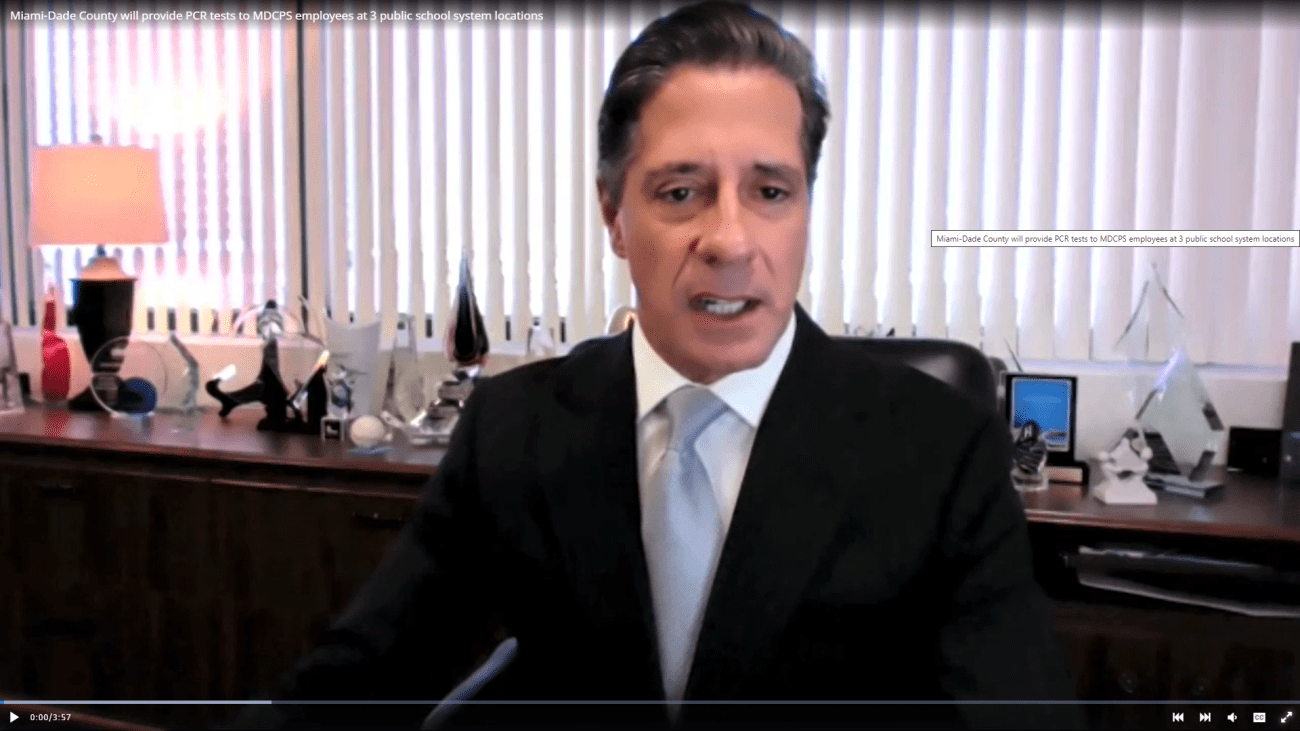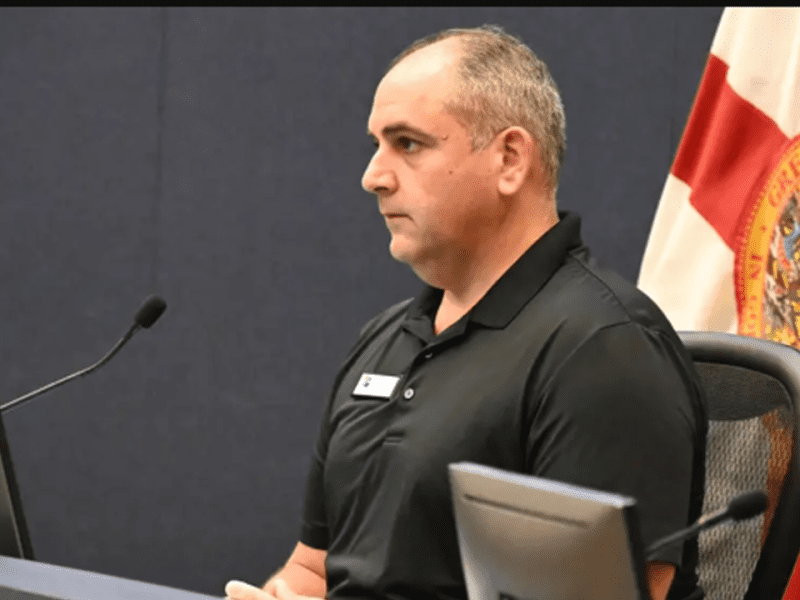Miami schools could’ve given ‘gold standard’ COVID tests since October but didn’t
Miami Herald | by Colleen Wright and Ben Conarck | December 22, 2020
When school resumes on Jan. 4, the “gold standard” test for COVID-19 will be available to employees of Miami-Dade County Public Schools and their dependents at three designated district sites.
But for four months, since schools in the nation’s fourth-largest school district reopened in October, the school district turned down the opportunity to offer the most accurate COVID-19 tests on the market to its workforce, instead offering a rapid antibody test that has an error rate as high as 20%.
Instead of polymerase chain reaction (PCR) tests, the school district decided to useantibody tests, which are not designed to diagnose active cases and instead look to the bloodstream for signs of past infection. If district employees tested positive, or negative but had symptoms, they were told to get the PCR test at a county site.
The district’s nearlymeaningless testing regime left teachers in the dark about how safe it was to return to the classroom and what they were signing up for when they went to the district’s “free COVID testing” sites. School Board Vice ChairmanSteve Gallon has raised several questions about how the district obtained the tests from a local vendor.
Meanwhile, the district used the wrong terminology to describe the tests, at one point saying it was antigen testing, which identifies active infections via a protein on the surface of the virus. Those tests are less sensitive than the PCR tests but could provide insight into whether someone was infected.
“My biggest concern is if people are taking that test and going back to work, they could be spreading it,” said one Miami-Dade elementary school teacher who asked not to be named. She said she and a colleague both tested positive for COVID-19 at urgent care after first testing negative at a district testing site.
“If it’s happening to us, how many people is it happening to?” the teacher said.
Anuco Rx, the provider of more than 5,000 antibody tests taken by school district employees, proposed also giving a nasal swab PCR test to those who tested positive from the fingerstick blood test for “confirmatory results.”
“We did propose a few options in reference to testing and described the capabilities of each of the testing options so it was up to them to make that selection,” Dr. Gina Jules, founder and CEO of Sunrise-based Anuco Rx, told the Miami Herald.
Instead, the district spent at least $375,000 for the first 5,000 antibody tests, plus another $52,000 for staffing, which district officials insist was not paid with taxpayer money. The costs were reimbursed by Cigna, the district’s healthcare provider, through its wellness fund as part of the district’s plan.
The PCR tests would have cost another $120 per kit. They would have been shipped to a lab in California that promised “definitive” test results in 24 to 72 hours. Anuco offered to give weekly stats reports for both antibody and PCR tests.
According to those reports, 6,136 antibody tests were administered from Oct. 5 to Dec. 5. Of those, 331 had positive test results, but only 7 of those positive tests showed that individuals had an active infection from the antibody screening.
ANTIBODY TESTS UNRELIABLE FOR DIAGNOSING COVID
Public health experts agree that the antibody tests simply have no place in diagnosing cases of COVID-19. That is done with a PCR test, an antigen test, or a rapid molecular test such as the Abbott assay once used at the White House.
Even the experts informing the the school district bashed the use of any COVID-19 test except a PCR test for admittance back to school at its last task force meeting.
“Forget about the stupid antigen test, no rapid test,” said Dr. Aileen Marty, an infectious disease expert and professor at Florida International University. “It has to be a RT-PCR test.”
Dr. Lisa Gwynn, a pediatrician with the University of Miami heading up UM’s pediatric mobile unit, warned that there was a “lot of misinformation about antibody tests.”
“We don’t know yet if the levels will confer immunity,” she said, pointing out that rapid tests have a false positive and false negative rate of up to 20%. “Antibody testing should not be used.”
“Rapid testing,” Gwynn said, “it isn’t the gold standard. …If you were to want to have the gold standard tested, it is the PCR test.”
THE FLAW IN ANTIBODY TESTS
That’s because antibody tests don’t detect the virus until at least five or six days at a minimum, said Gigi Gronvall, an immunologist and senior scholar at the Johns Hopkins Center for Health Security.
“By the time they’re getting a positive result from the [antibody] test, they’ve pretty much gone through their entire infectious period,” Gronvall said. “It’s not good for diagnosis.”
The school district contends that its workforce already had access to take the PCR test. Back in March, Superintendent Alberto Carvalho announced that insurance co-payments would be covered for employees who got a COVID-19 test through a healthcare provider. The district said Miami-Dade County already had drive-through and walk-in sites for PCR tests.
What was missing, Carvalho said, was a rapid test. Lines at county sites were hours long in the summer, and a School Board proposal passed in August sought testing for employees with “timely and expeditious” test results.
“We recognize the limitations that this type of rapid testing that is currently being offered carries,” he said recently, mentioning that the antibody tests were proneto false negatives. “We have evolved, and we’re now in a position of eliminating it and replacing it with a free approach of a PCR test.”
That’s because antibody tests don’t detect the virus until at least five or six days at a minimum, said Gigi Gronvall, an immunologist and senior scholar at the Johns Hopkins Center for Health Security.
“By the time they’re getting a positive result from the [antibody] test, they’ve pretty much gone through their entire infectious period,” Gronvall said. “It’s not good for diagnosis.”
The school district contends that its workforce already had access to take the PCR test. Back in March, Superintendent Alberto Carvalho announced that insurance co-payments would be covered for employees who got a COVID-19 test through a healthcare provider. The district said Miami-Dade County already had drive-through and walk-in sites for PCR tests.
What was missing, Carvalho said, was a rapid test. Lines at county sites were hours long in the summer, and a School Board proposal passed in August sought testing for employees with “timely and expeditious” test results.
“We recognize the limitations that this type of rapid testing that is currently being offered carries,” he said recently, mentioning that the antibody tests were proneto false negatives. “We have evolved, and we’re now in a position of eliminating it and replacing it with a free approach of a PCR test.”
The district is now giving both antibody and PCR tests at its three established sites on Tuesdays, Thursdays and Sundays with help from Miami-Dade County. That announcement came earlier this month at a press conference promoting the county’s new coronavirus prevention campaign.
It was also announced then that the county’s chief medical officer and Jackson Health System’s chief physician executive and chief clinical officer, Dr. Peter Paige, would advise the school district after two unsuccessful attempts at hiring its own chief medical officer.
Paige defended the district’s antibody testing program, calling it a “rapidly evolving process.”
“I think that there are different formats for different tests,” he said. “That core testing was not taken away, it was added to. I think what we need to do is to be constantly looking for opportunities.”
Beginning Jan. 4, the PCR tests will replace the antibody tests andbe offered throughout the week to M-DCPS employees and their family members over the age of 5 at these three locations: Maintenance Service Center I, 12525 NW 28th Ave., Miami 33167; Stores & Mail Distribution, 7001 SW 4th St., Miami 33144; Transportation Administration, 15401 SW 117th Ave., Miami 33177.
Robert Morgan Educational Center, a designated site for antibody tests, will not serve as a PCR test location on Jan. 4.
Additionally, the University of Miami Health System’s Pediatric Mobile Unit will provide free COVID-19 testing to children ages 4-18 at various school parking lots over winter break.
UNCLEAR LANGUAGE
A memo went out to the school district’s workforce on Oct. 2 announcing “Free COVID-19 testing.”
The tests are described as “rapid tests” with results in 10 to 15 minutes. Though the test is described as a finger-stick blood draw, there is no mention of the words “antibody” or “antigen.”
School district officials have publicly said several times that employees and dependents who have symptoms but test negative on the antibody test given at school testing sites are given a flier that directs them to a county site for a confirming PCR test.
But the flier shown to the Miami Herald had no clear information about that — just information stating “common questions” about antibody testing and a list of the symptoms common with COVID-19.
In explaining what the coronavirus antibody test is, the flier explained two different types of tests: “Diagnostic” tests that show an active coronavirus infection and antibody tests that show if coronavirus antibodies are present, which takes “days or weeks to develop” following exposure to COVID-19. It adds that a positive result means “you likely have a COVID-19 infection.”
A spokeswoman said those who are tested are actually told verbally, and then given a flier, to visit a county site if they have symptoms. She also pointed to links at the bottom of the flier listing testing locations across Miami-Dade County, located under “other resources.” There is no information about false negatives or false positives, or what a PCR test is or does.
“Maybe we should’ve done a better job explaining the difference,” said Carvalho. “And maybe we made an assumption.”
He contends that the district disclosed what the test involves, and that people know the difference between rapid tests and PCR tests.
“That is the vehicle by which you do rapid testing for antibodies,” he said. “I believe by now everyone knows that the rapid body test [is unlike] the deep probe of nasal cavity.”
Carvalho said that the many in the workforce “appreciate the expediency of the test even though the paper they get clearly says, ‘This cannot be said with certainty,’” he said.
Asked about follow-up district written and verbal information that described tests as “antigen” rather than “antibody,” Carvalho said it was the “honest misuse of a word.”
UNORTHODOX PROCUREMENT
The school district did not go through its normal purchasingprocess to obtain the rapid antibody tests.
For a while, the district didn’t even have proper liability coverage in place for the medical personnel working the testing sites who were drawing blood. That has since been squared away.
Gallon, the vice chair of the school board, has repeatedly taken issue with the way these tests were obtained. Back in September, he launched an aggressive line of questioning about the contract in place to do the testing.
The district’s chief auditor, Maria T. Gonzalez, conducted interviews and requested and reviewed information on the matter. Her memo to School Board members particularly about Gallon’s questions said the district had no formal contract in place with Anuco, only a statement of work, which had not been presented to the School Board attorney’s office per School Board policy.
Gonzalez explained that according to the contract between Cigna and the district, Cigna contributes $1 million to the wellness fund annually, and that contribution is derived from administrative fees that Cigna charges the school district. She deferred to the district’s legal department for a legal determination.
Asked about liability, Gonzalez said School Board Attorney Walter Harvey said that the indemnification clause in Anuco’s statement of work and the district’s liability insurance provide “minimal protection” for the district. According to Gonzalez, he added that a full contract with Anuco and Cigna would “be more defensible if claims arise.”
The district later put together a contract with Anuco that was signed by Carvalho’s designee, chief of staff Jaime Torrens, on Nov. 4, a month after testing began.
Photo: The Miami-Dade County school district gave out this flier and verbally told employees and their dependents at their COVID-19 antibody test sites to get a PCR test if they tested negative but have symptoms. MIAMI-DADE COUNTY PUBLIC SCHOOLS






